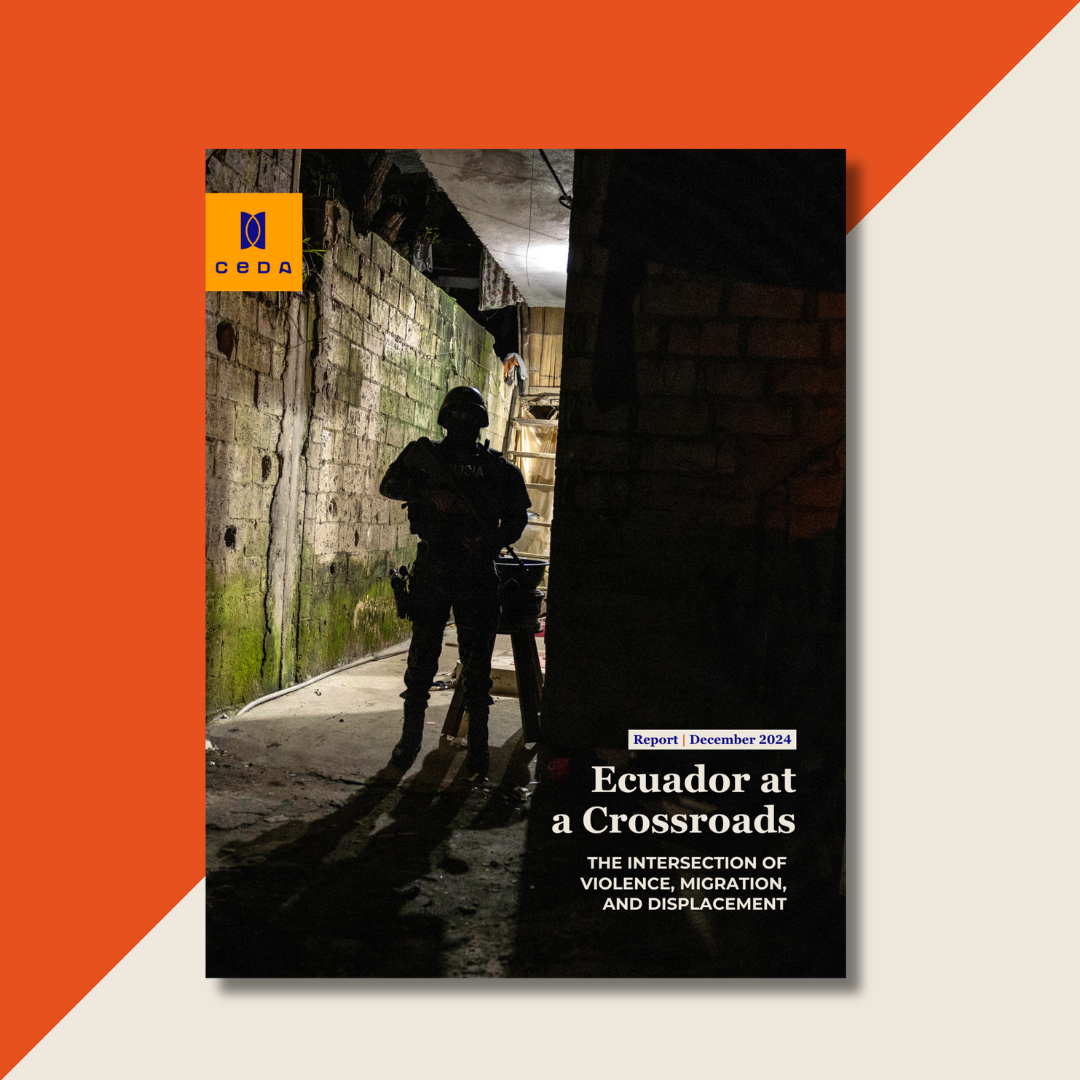New CEDA Report Examines Violence, Migration, and Displacement in Ecuador
CEDA’s latest report delves into the concurrent crises and resulting migration in and out of Ecuador.
Washington, DC – A new report from the Center for Engagement in the Americas (CEDA), Ecuador at a Crossroads: The Intersection of Violence, Migration, and Displacement, reveals how a nation once hailed as an “island of peace” now grapples with escalating violence and insecurity that are placing significant strain on humanitarian protection systems. The report examines how violence is reshaping migration patterns within and beyond Ecuador’s borders, driving internal displacement, record emigration, and mounting pressures on migration and humanitarian systems.
“Ecuador is grappling with an unprecedented migration crisis as a nascent internal displacement situation emerges and emigration surges,” said Francisca Viguad-Walsh, report author and Director of Strategy and Advocacy at CEDA. “This report underscores the urgent need for robust legal frameworks, streamlined migrant protections, and enhanced international cooperation to address root causes and support stability in the region.”
Key Findings Include:
Internal Displacement: A growing number of Ecuadorians and resident migrants are becoming displaced due to violence, extortion, and forced recruitment. Nearly a quarter million people in Ecuador are internally displaced, according to a recent study by 3iSolution. Of these, 81,000 were forced to flee their homes specifically due to violence. While the 3iSolution survey was administered only to individuals with internet access, the data underscores a concerning and accelerating trend of displacement driven by Ecuador’s rising violence.
Escalating Emigration: Since 2021, over 430,000 Ecuadorians have left the country, driven by mounting violence and economic pressures. Most are attempting to reach the United States despite stricter border controls and deterrence measures. Additionally, 25% of surveyed Venezuelans intending to leave Ecuador cited insecurity, violence, and threats as their primary motivations.
Humanitarian Strains: Ecuador’s limited humanitarian resources are stretched thin. The displacement of Venezuelans, new internal displacement, and an influx of Colombian asylum seekers—reaching their highest levels since 2017—are straining support systems. Meanwhile, the 2024 refugee and migrant response plan for Ecuador is less than 26% funded, leaving thousands in dire need.
Integration Barriers: High fees and bureaucratic hurdles continue to hinder regularization and integration for migrants, limiting access to documentation, services, and employment. Alarmingly, only 30% of Venezuelans hold a valid visa or stay permit.
Human Rights Defenders at Risk: Violence linked to extractive industries, labor disputes, and environmental conflicts has placed human rights defenders and community leaders under significant threat, forcing many into hiding or displacement.
To address these mounting challenges, CEDA urges:
The swift adoption and implementation of legal frameworks to protect displaced populations and address internal displacement.
Streamlined migrant regularization processes, including documentation exemptions for vulnerable groups such as unaccompanied children and survivors of violence.
Flexible humanitarian financing to respond to growing needs and prioritize at-risk populations, including human rights defenders.
Expanded legal pathways for migration and protective measures for Ecuadorians abroad.
International cooperation to tackle the root causes of migration, including insecurity, economic fragility, and governance challenges.
“Ecuador’s migration crisis is a red alert for the region. We are witnessing a perfect storm that could destabilize Ecuador and ripple across the region,” added Vigaud-Walsh. “With Ecuador’s February 2025 elections on the horizon and potential shifts in U.S. policies—such as mass deportations and cuts to humanitarian aid—action must be taken now to shore up Ecuador’s migration systems and avoid a worsening crisis.”
Read our report: Ecuador at Crossroads: The Intersection of Violence, Migration, and Displacement
###
About CEDA
The Center for Engagement and Advocacy in the Americas (CEDA) is a non-profit based in Washington, D.C. whose mission is to promote policies in the United States and throughout the Americas that are founded on partnership, mutual respect, and constructive dialogue. CEDA advocates for policies that enhance the well-being and respect the dignity and rights of people across the Americas. CEDA’s migration work advocates for a rights-based and protection-sensitive migration governance regime that allows for safe, orderly, and humane migration in the Americas. CEDA fulfills its mission by conducting on-the-ground research, leading delegations, and providing a direct interface between policymakers and the affected populations.

